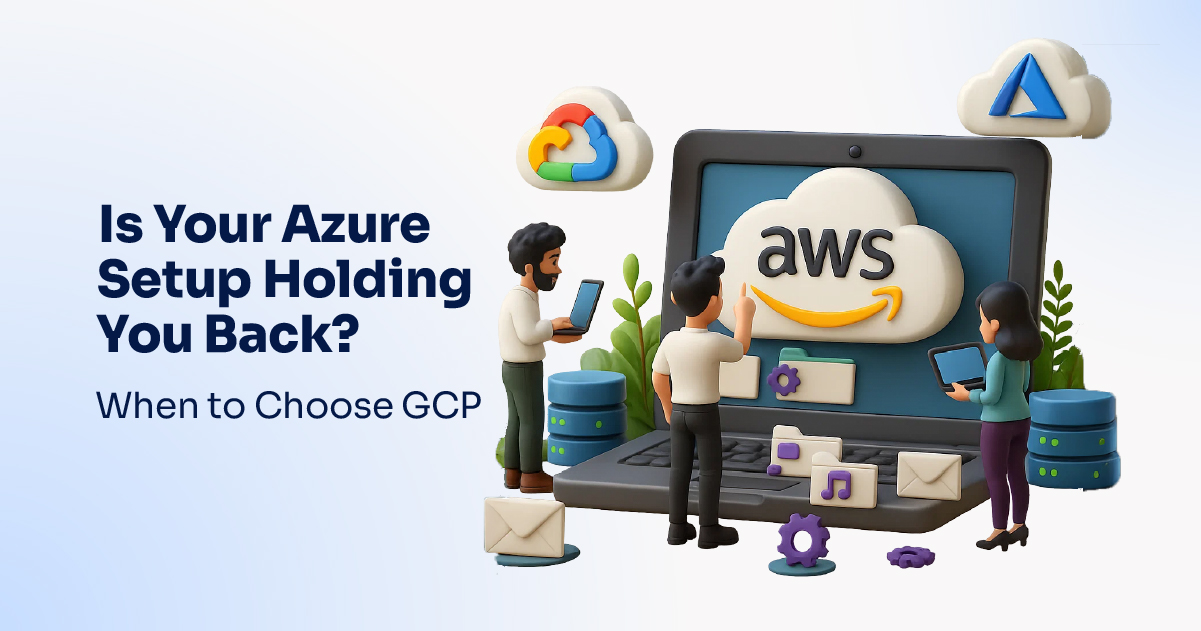
Cloud computing has become the backbone of modern digital infrastructure, empowering businesses with agility, scalability, and innovation. Microsoft Azure is one of the top cloud platforms in this arena, widely adopted for its integration with Windows environments and its comprehensive suite of services. However, as organizations evolve, so do their needs—and what once worked effectively may start creating friction. If you’re experiencing growing pains with Azure, it may be time to ask: Is your Azure setup holding you back?
In this blog, we’ll explore the signs that your Azure environment might be limiting your business, why organizations are increasingly considering a switch to Google Cloud Platform (GCP), and how Cloud Migration Services can ensure a smooth, secure transition.
Why Azure Might No Longer Be the Right Fit
While Azure remains a robust cloud platform, several issues can hinder performance, efficiency, or innovation for growing businesses. Here are some signs your Azure setup could be holding you back:
1. Cost Overruns Without Optimization
Azure’s pricing model, though flexible, can become complex and costly without continuous optimization. If your team lacks the expertise or tools to manage resources effectively, you might find yourself paying for unused or underutilized services.
2. Performance Bottlenecks
Certain workloads, especially those involving high-performance computing or advanced analytics, might not perform as efficiently on Azure as they would on platforms like GCP. If you’re experiencing lag, downtime, or limitations in scalability, it’s time to reassess.
3. Lack of AI/ML Integration
GCP has earned a reputation for its cutting-edge artificial intelligence and machine learning capabilities, thanks to Google’s expertise in AI research. If your organization relies heavily on data science or predictive analytics, GCP may offer a more innovative environment.
4. Integration Challenges
Azure integrates seamlessly with Microsoft products, but if your organization is leveraging a more diverse tech stack—including open-source tools or container-based workflows—GCP may offer better flexibility and compatibility.
5. Innovation is Slowing Down
Sometimes it’s not about what Azure lacks, but what your business needs next. GCP’s emphasis on developer productivity, Kubernetes-native services, and data-centric solutions makes it an ideal choice for companies focused on rapid innovation and transformation.
Top Reasons Businesses Migrate from Azure to GCP
1. Superior Big Data & Analytics
Google Cloud offers powerful analytics tools such as BigQuery, which can analyze terabytes of data in seconds. If data insights drive your business strategy, this alone can justify a migration.
2. Kubernetes and Container Leadership
Google created Kubernetes—and GCP remains its most native and optimized environment. If your business is container-driven or planning to be, GCP provides unmatched support and scalability for microservices-based architectures.
3. Cost Efficiency with Sustained Usage Discounts
GCP offers a unique sustained-use discount model, automatically reducing costs the longer you run workloads. This often results in more predictable and cost-effective billing for businesses compared to Azure.
4. AI and Machine Learning Leadership
From Vertex AI to TensorFlow and advanced language models, GCP is a pioneer in artificial intelligence tools. Businesses in finance, healthcare, or e-commerce that rely on predictive modeling or real-time personalization find GCP’s ML suite compelling.
5. Open-Source Friendliness
Google’s active role in open-source communities (e.g., TensorFlow, Kubernetes, Istio) and strong support for Linux and OSS tools make GCP a more flexible option for development teams working in non-Microsoft ecosystems.
When Should You Consider GCP Migration?
Migrating cloud platforms is not a trivial task—it requires technical planning, security considerations, and stakeholder alignment. However, here are situations when moving from Azure to GCP becomes a strategic necessity:
- You need better support for large-scale data analytics.
- Your cloud spend is rising uncontrollably.
- You’re adopting containers or a DevOps-first culture.
- You’re scaling quickly and need better performance at a lower cost.
- You want to integrate more AI and ML into your operations.
- Your development teams are slowed down by Azure’s proprietary restrictions.
Planning Your Azure to GCP Migration
Migration is a journey, not a sprint. A successful transition from Azure to GCP starts with careful assessment and strategy. Partnering with an experienced provider of Cloud Migration Services ensures:
- Comprehensive Audit: Evaluate your current Azure architecture, workloads, and dependencies.
- Migration Blueprint: Define target architecture in GCP with minimal disruption.
- Security & Compliance Alignment: Ensure all security protocols and industry regulations are met.
- Data Integrity: Safeguard critical business data throughout the transition.
- Post-Migration Support: Address performance optimization and train teams on GCP workflows.
Conclusion: Embrace the Cloud That Grows with You
Your choice of cloud platform should empower your organization—not restrict it. While Azure offers many benefits, it may not always align with your evolving goals, especially if you’re pursuing innovation, cost optimization, or advanced data analytics. If you’re noticing signs of stagnation or inefficiencies, it might be time to re-evaluate your cloud strategy and consider the possibilities with Google Cloud.
Don’t let your current setup become your ceiling. Leverage expert Cloud Migration Services from trusted partners like Exinent to make the switch with confidence. Future-proof your infrastructure, enhance agility, and tap into the full potential of the cloud.
